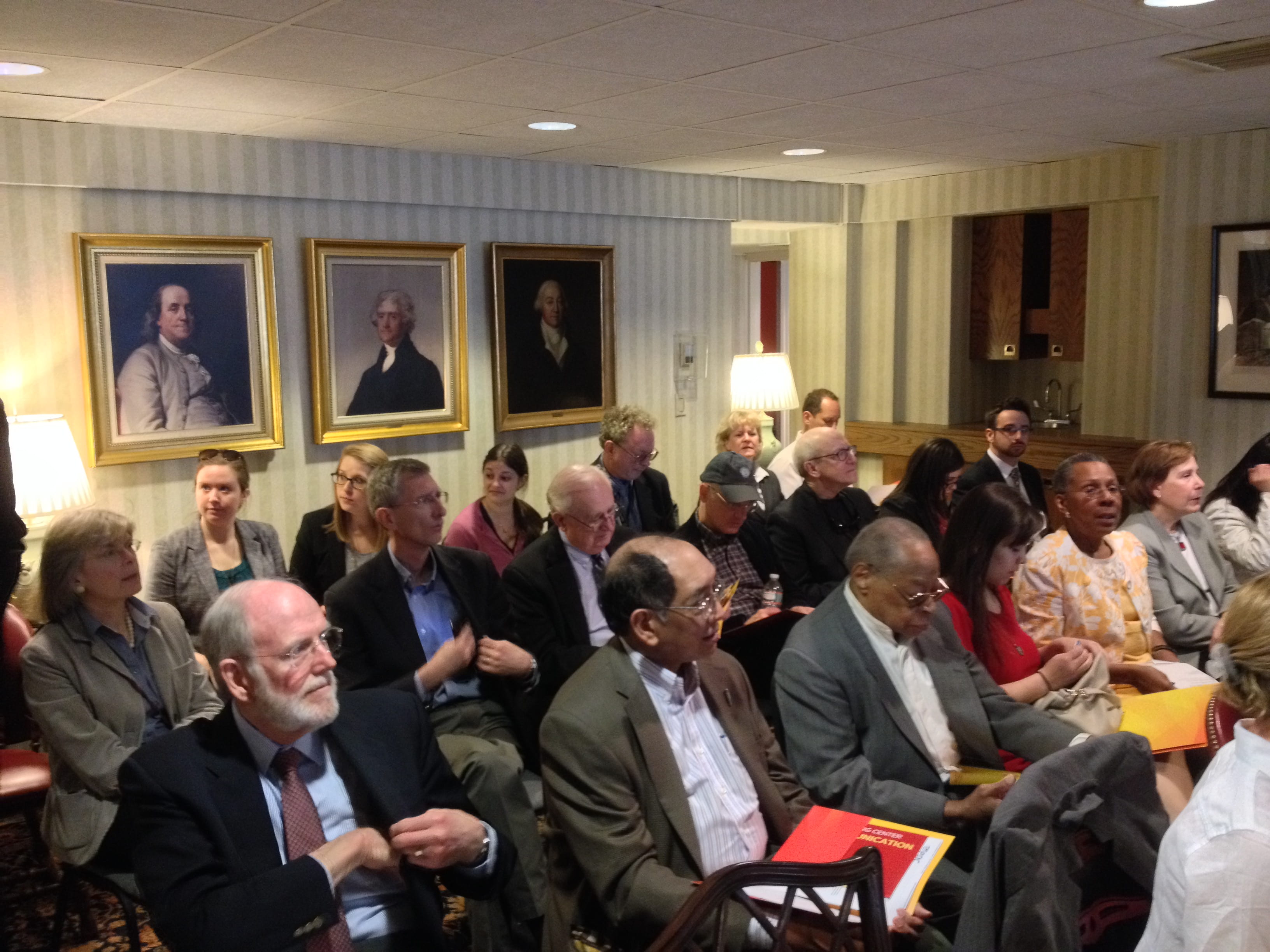WASHINGTON – 98 years ago, the United States government formally inaugurated the first American agency of public diplomacy, and it faced the same questions in 1917 during World War I that the U.S. faces in 2015 against ISIS.
That agency, the Committee on Public Information (CPI) was created to counter German propaganda and to create a more favorable image of the U.S. both at home and around the world. This agency and its mission was the topic of the Center on Communication Leadership & Policy’s Washington Communication Leadership forum on Monday, featuring historians from the State Department and academic experts who have studied the roots of American public diplomacy.

John Brown, Caitlin Schindler, Aaron Marrs, and Adam Howard at the CCLP Washington Communication Leadership forum (Photo by Joe Johnson)
“That is when it started institutionally,” said Adam Howard, an historian at the State Department who edits a series, Foreign Relations of the United States, documenting U.S. public diplomacy from 1917 to the present. Only part of the series is finished: according to Howard, they are still working on the years of the Kennedy, Johnson and Nixon administrations. But understanding the early days is important to understanding the later years.
“People don’t understand how much started” in those first few decades in the years before World War II, explained Howard.
Aaron Marrs has been concentrating on the 1917 start of formalized U.S. public diplomacy for the State Department. Marrs said that in the institutionalization of public diplomacy in the CPI, the government embarked on a wide range of activities, from pamphlets to films, spread across the country and across Europe, Asia and Latin America. The U.S. established reading rooms in other countries and translated speeches by President Wilson for foreign readers.
“Public diplomacy has been very much a part of what we as a nation did in the world,” added Caitlin Schindler, a scholar on early public diplomacy at the University of Leeds. And she delved into a key issue of 1917 which reverberates today: was CPI a propaganda agency?
“It was propaganda, but it wasn’t German propaganda,” she said, adding that in 1917 Europeans “were up to their eyeballs in propaganda.”
So how should the U.S. respond? The answer, according to Schindler, came from the people recruited to staff CPI – “mainly newspaper people” – and their view reflected their experience:
“The best way to [combat German propaganda] is straight news.” Schindler added that they wanted to distinguish between German “political propaganda” and U.S. “news propaganda.”
After the end of the war, she said, U.S. embassies asked Washington “to keep doing this.” And so it continued, for commerce – “advertising the U.S. for business” – and because “everyone else was doing it.”
The U.S. tailored its messages and media for each country. For example, in Switzerland, according to Schindler, many pamphlets were distributed. But in Mexico, she said, where literacy was lower, films were a primary medium.
John Brown, a former U.S. diplomat who now studies public diplomacy – and who planned and moderated this month’s forum – noted an early and negative association with the CPI. Also called the Creel Commission, after CPI’s chairman George Creel, the CPI was accused of being less than entirely truthful. Brown said that was the reason a new word entered the American vocabulary, “Creeling,” a synonym for lying.
But in one important way, Howard and Marrs said, their work studying early 20th century records is much easier than the task they and other historians will have studying U.S. public diplomacy of this century: the records are all archived on paper. There is “huge concern,” according to Howard, about archiving of electronic records of all kinds, records which can so easily be erased and lost forever.
“It’s not just email,” he said.

This CCLP Washington Communication Leadership program was part of a monthly series of lunch forums presented in partnership with the USC Center on Public Diplomacy and the Public Diplomacy Council.
Next month’s forum, scheduled for Monday, May 4, will focus on China’s investment in U.S. television.